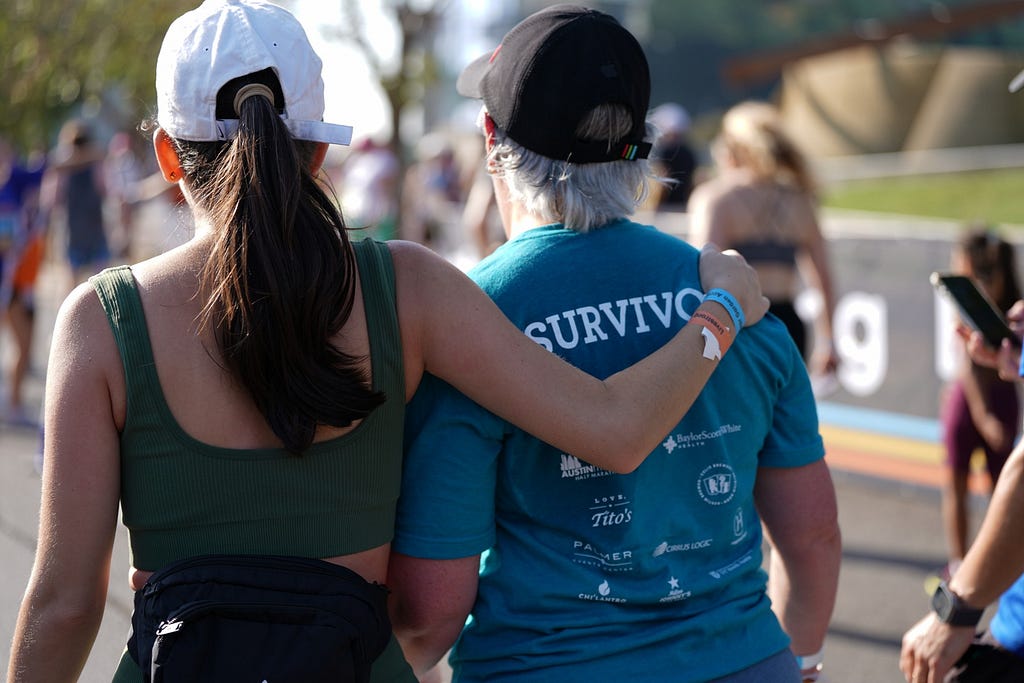Strong in Spirit — Strategies for Maintaining Your Mental Health During Cancer
Strong in Spirit — Strategies for Maintaining Your Mental Health During Cancer
by Tara Probasco

When you receive a cancer diagnosis, it can feel as though your whole world has been turned upside down. Suddenly, you are plagued with uncertainty about what the future holds. You find yourself experiencing a complex mixture of emotions, including anxiety, sadness, anger, fear, and disbelief. You may feel pressure to ‘keep your chin up’ or ‘think happy thoughts.’ However, it is crucial to acknowledge that this can be incredibly challenging. So, how do you maintain an optimistic outlook after a cancer diagnosis?
First, realize that you don’t have to feel positive 100% of the time. Allowing yourself time to grieve and process difficult emotions is just as important as having a positive attitude. That being said, there are many benefits to cultivating an upbeat and hopeful demeanor. Embracing positivity empowers you to navigate your treatment and helps you feel more in control. Additionally, you deserve as much happiness as possible while coping with cancer.
Staying positive doesn’t mean forcing yourself to remain relentlessly cheerful while suppressing hard feelings. It simply means acknowledging your situation and all the emotions that come with it but choosing to embrace a ‘glass half full’ attitude when possible. Livestrong is committed to empowering the cancer community by sharing strategies for maintaining optimism while still honoring your feelings.
Surround yourself with positive people and positive energy
It is essential to create a positive environment for yourself. Find people and activities that improve your outlook. An uplifting atmosphere will provide the buoyancy you need to stay afloat during this storm.
- Spend quality time with family and friends who lift you up while allowing you to be yourself. This does not mean dismissive people who say, ‘Everything will be ok.’ Call up a friend who can make you laugh after you’ve had a good cry. Chat with a family member who lightens the load by validating what you are going through. Connect with those who gently push you when needed, inspire you to feel courageous in the face of fear, and bring out the best in you.
- Utilize helpful resources: Play uplifting music, read inspirational books, watch funny or heartwarming videos, listen to encouraging podcasts, spend time in nature, or join a support group.
“You are not broken. Adjusting to life with or after cancer takes time. Do it at your own pace, but don’t do it alone. Find the support systems that work for you and use them.” -Brian, cancer survivor

Reshape your mindset
The practice of cognitive reframing means shifting the way you choose to view a situation. Your circumstances don’t change, but your outlook does. Applying cognitive reframing to challenging situations has been clinically proven to increase resilience, lower stress, and improve quality of life.
- Are you midway through your scheduled chemotherapy sessions? You have the power to choose between two different mindsets. You can dread the ones still to come or celebrate the fact that you made it halfway through.
- Anxious about losing your hair? Focus on the pocket-sized positives; you don’t have to shave your face or legs, tweeze or wax, and you can change your look with fun wigs.
- Are you upset about losing your independence? Instead of thinking negatively, write thank you notes to everyone helping you in your daily life.
Spend time doing activities you enjoy
What makes you happy? It’s easy to allow simple pleasures to fall by the wayside after receiving a cancer diagnosis. Take a moment to focus on your life and consider what brings you joy. Connecting with old and new passions can help you stay upbeat and optimistic.
- As much as you are able, take time to engage in activities that you find pleasurable. If you love to draw, keep a sketchpad with you. If you love to sing, belt out tunes in your car. If you love hiking but find it too physically demanding, take a short nature stroll instead.
- Discover interests that are outside of your usual box. Pick up a hobby or craft you’ve always wanted to try, cook a new recipe, attend a free online class, or learn a new skill.
- Attend events like the Livestrong Challenge that connect you with other survivors.
“Take care of yourself and remember that you are a person and you are not the illness.” -Tenise, cancer survivor

Maintain an attitude of gratitude
It can be hard to feel grateful when facing difficult circumstances. However, practicing thankfulness has been proven to promote optimism. Try to focus on your blessings instead of your burdens whenever possible.
- Find the silver linings in your life. Have any of your relationships improved as a result of your cancer diagnosis? Have you reconnected with an old friend or made new ones? Do you have more compassion and empathy for others? Have you been able to let go of past hurts or regrets that no longer seem so important? You may be surprised to discover that certain aspects of your life have become enriched.
- Keep a gratitude journal by writing down things you are thankful for each day. These need not be significant events, although they sometimes can be, like attending the wedding of someone special to you. Pleasure also comes in small packages. The beauty of a glorious sunrise, a laugh with a good friend, or enjoying time with a beloved pet can all leave you smiling as you take the time to write them down.
Speak to a specialist
Even in today’s day and age, you may feel that there is a stigma attached to seeking professional help. Family and friends may be highly supportive, but they cannot fully understand what you are going through unless they too have received a cancer diagnosis. Cancer patients who seek therapeutic help often report increased feelings of positivity and hope.
- A therapist can provide valuable insights and tools that will help you cope with your unique experience in dealing with a cancer diagnosis. You will leave your sessions feeling more empowered and informed.
- Therapy provides a safe and confidential space to discuss difficult emotions honestly. This will help you feel more understood and less isolated. You will also be encouraged to challenge negative thought patterns and form a more optimistic outlook.
“When I came out of treatment, I felt more than just sad. I was depressed. For some people, the idea of going to a counselor was something you just didn’t do. I found it to be one of the best things I have ever done. It was important for me to talk to someone who was not my doctor or in my family.” -Brian, cancer survivor

Our goal at Livestrong is to help cancer patients throughout all aspects of their journey. We hope the strategies presented here will empower you to remain optimistic while coping with cancer. From diagnosis to treatment to survivorship, we aim to inspire you to live your best life.
About the Author
Tara Probasco is an RN with over 15 years of experience and a master’s degree in nursing education. She is also an avid equestrian, enthusiastic hiker, dog mom, pseudo-chef, and devoted wife.
Strong in Spirit — Strategies for Maintaining Your Mental Health During Cancer was originally published in Livestrong Voices on Medium, where people are continuing the conversation by highlighting and responding to this story.